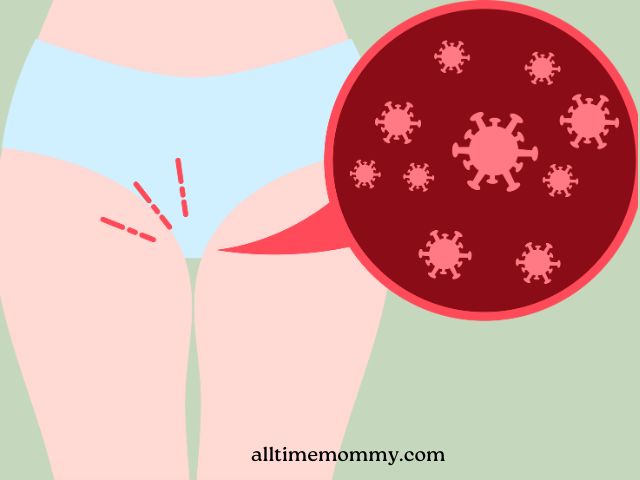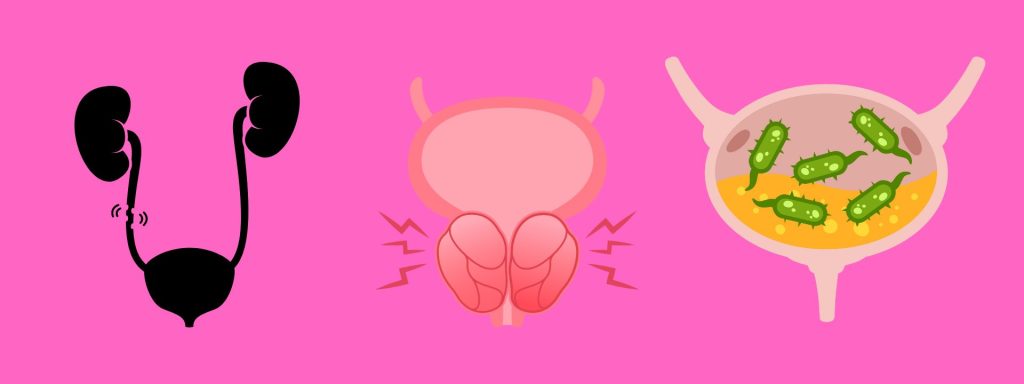Discover the best home remedies for uti in women. Learn the natural tactics on how to prevent UTI and improve your urinary health without relying on antibiotics.
If you’ve ever had a urinary tract infection (UTI), you probably know how uncomfortable it can be.
Frequent urination, fishy odor, vaginal itchiness, and unending vaginal discharge can be annoying.
But you don’t have to suffer over and over, mama.
In this guide, you’ll learn how to prevent recurring UTIs using natural remedies at home.
Here, you’ll find simple yet effective tips for keeping your urinary tract healthy with fewer recurring Urinary Tract Infections (UTIs) episodes.
But before I reveal the remedies on how to prevent UTI, let’s first have an overview of Urinary Tract Infections.
Ready to learn?
Let’s dive right in.
Affiliate Disclosure: As an Amazon Associate, I get a small commission for purchases made from Amazon.com through links in this post. Learn more about our affiliate disclaimer here.
What is Urinary Tract Infections?
The Mayo Clinic defines (UTI) as an infection or sickness that attack any part of the urinary system. Your urinary system consists of the kidneys, ureters, bladder, and urethra.
According to the National Institute of Health, UTI may develop when microbes, especially bacteria, enter the urinary tract and disrupt the normal functioning of these organs.
The most common cause of UTI is E. coli bacteria. This bacteria, which lives in the bowel, is usually harmless. But, when it overgrows can cause UTIs.
Most infections involve the lower urinary tract — the bladder and the urethra. However, if left untreated, the infection may get severe and spreads to the kidneys.
Studies indicate that women are at a higher risk of contracting UTIs, and here is why;
Women are affected more often than men because of their reproductive health anatomy.
Basically, women have short urethras. The short distance between the vulva and urinary tract allows easy passage of bacteria into the bladder.
Also, a woman’s urethral opening is close to the bowels (anus). As such, you can easily pass bacteria from the anus and vagina, especially when using the washroom.
Additionally, factors like regular and intense sexual intercourse or inappropriate use of toilets may introduce and cause bacteria to spread upward into the bladder much faster, thus resulting in infections.
Other factors that may also result in UTIs include using scented soaps, spermicides, and douching regularly.
Douching and the use of scented soaps seem to change the typical bacterial environment around the urethra.
Changing the pH in your vagina may create a conducive environment for harmful bacteria to thrive and cause infections.
Types of Urinary Tract Infections
There are two types of urinary Tract Infections;
- Lower tract infections involve Infection of the bladder (cystitis) and infection of the vagina (vaginitis). These infections are mainly caused by bacteria residing in the intestine. If these bacteria spread from the anus to the urethra and bladder, they may invade the Urinary tissue, grow, and cause infection.
- Upper tract infections involve the ureters and kidneys (urethritis). The infections may occur when bacteria travel from the bladder or any other body part through the bloodstream into the kidney.
Symptoms of UTIs
Common symptoms of UTIs include:
- Frequent urination with a sense of urgency
- Pain or burning sensation when urinating
- A feeling of still having a full bladder after urinating
- Cloudy and smelly urine.
- Lower abdominal pain
Risk factors
Why do I keep getting urinary tract infections?
Factors that may increase the risk of a UTI include the following:
- Engaging in frequent sexual activities.
- pregnancy and hormonal imbalances
- sex with a new or many partners
- a previous UTI
- Conditions like diabetes
- Having a weak immunity
- urinary or genital disorders
Why Antibiotics sometimes don’t work
Most mild UTIs can be easily eliminated with antibiotics.
But this isn’t always the case.
Some UTIs don’t clear up after antibiotic therapy. This means you may need a different antibiotic to treat your infections.
Research has indicated that the overuse of antibiotics can also lead to antibiotic resistance. This is a challenge most women have to deal with, especially if they have recurring UTIs.
Besides, antibiotic overuse may disorient your microbiota flora. Resulting in the overgrowth of bad microbial like yeast. This increases the risk of recurring infections.
Because of this risk, experts have been looking for other ways to treat UTIs alongside antibiotics.
That is where alltimemommy gives you scientifically proven home-based alternative treatment for recurring UTIs.
How To Treat Urinary Tract Infections With Home Remedies
1. Increase Your Water Intake at the First Sign of UTI
Well, mama, this trick seems too obvious, but it helps. Studies have proved that increasing your water intake at the first sign of UTI may help lower the risk of bacteria spreading in your urinary tract.
But how does drinking water help prevent UTIs?
Drinking water helps dilute your urine and increase the frequency of urination.
Whereas you may dislike the act of frequenting the washroom, frequent urination is a sure way of flushing bacteria from your urinary tract before an infection can begin.
According to a study conducted in a nursing home, improved hydration decreased UTIs requiring antibiotics by 58%.
Similarly, in a clinical trial involving 140 premenopausal women with recurring UTIs, Scientists found that an increase in fluid intake led to decreased UTI frequency.
To be safe;
- Aim to take at least two litres of water daily to flush out your urinary tract.
- Also, be sure to urinate after having intercourse. This will significantly lower the risk of experiencing recurring UTIs.
Other recommended lifestyle adjustments to help prevent recurring UTIs include;
- Wipe from front to back after using the toilet. Doing so will help prevent the spread of bacteria to the urethra.
- Swap your soothing bath soaks with luxurious showers, especially if prone to frequent UTIs.
- Invest in a bidet. A bidet isn’t just an excellent option for cleaning up after a toilet-long call. You can use it to freshen up after sex or during your period.
Action; Get a good water bottle that you can carry everywhere to allow you to sip water throughout the day while tracking your consumption.
2. Cranberry Juice for UTIs Prevention
Studies suggest that about 50% of women, compared with 12% of men, will develop a UTI in their lifetime.
This can significantly affect the quality of life.
If you’re looking for a way to keep UTIs at bay, Cranberry juice may be your best solution.
Why?
Because research shows that drinking 100 % cranberry juice or taking cranberry extract capsules can help reduce the risk of experiencing recurring UTIs by about 26% in women.
But how does cranberry help prevent UTIs?
Cranberry contains compounds like polyphenols (Proanthocyanidins). These compounds may help interfere with the ability of bacteria to stick to the lining of the urinary tract. By so doing, cranberry may help;
- reduce inflammation
- Modulate gut bacteria
- Decrease the number of bacteria held in “reservoirs” in the bladder and gastrointestinal tracts that can lead to UTIs.
Additionally, studies prove that consuming a cranberry juice beverage may lower the chances of having recurrent UTIs in women with a history of UTIs, older women approaching menopause, and healthy children.
Forms and dosage
Cranberry juice may not help in active UTIs; however, it can effectively lower the risk and prevents recurring UTIs.
According to One research taking a dose of 8–10 ounces (240–300 mL) daily of 100% cranberry juice may effectively control UTIs in women.
A small preliminary trial found that supplementation with encapsulated cranberry concentrate (400 mg twice per day for three months) significantly reduced the recurrence of UTIs in women (aged 18–45)
And in case you’re going for cranberry extract, which is most effective due to its high concentration of polyphenols compounds, you may need to take about 200–500 mg daily to reduce UTI recurrence.
Ready to give it a try?
3. Consider D-mannose Supplement to Suppress UTIs
D-mannose is a type of sugar that occurs naturally in your body. Its also found in some plants like cranberries, peaches, and apples in the form of starch.
For years, women have used D-mannose to treat and prevent urinary tract infections (UTIs).
Why?
Because some studies suggest that D-mannose can block certain bacteria from growing in the urinary tract.
But are these claims valid?
As a woman who has experienced recurring UTIs, I’m compelled to look for evidence. And here is the result.
According to TAU, a Journal for Science and Art of Andrology, E. coli bacteria may be responsible for about 90% of Urinal Track Infections.
These bacteria are thought to enter and latch themselves onto your urinary tract cells. If left to grow, these bacteria may cause infection.
Studies suggest that D-mannose may help prevent UTIs by stopping these bacteria from latching on.
Infact, this study points out that D-mannose was more effective in reducing UTI symptoms in women with an active infection compared to some antibiotics.
Additionally, another study involving 43 women with an active UTI concluded that D-mannose could improve UTI symptoms.
Forms and dosage
D-mannose is a darling to people with frequent UTIs. It can help prevent or treat an active UTI. This supplement comes in capsules and powders. But you must first understand why you’re using it before settling on a dosage.
- For preventing frequent UTIs: 2 grams once daily or 1 gram twice daily may be enough.
- For treating an active UTI: 1.5 grams twice daily for 3 days, and then once daily for 10 days; or 1 gram three times daily for 14 days
Do you want to give it a try? Shop now on Amazon.
4. Prevent UTIs with Golden Seal Herbs
Golden seal is a perennial plant found in eastern North America. According to research, golden seal is one of the effective natural treatments for UTI.
This is because the herb contains Berberine, a plant alkaloid with a history of medicinal use.
According to a study, golden seal extracts and decoctions of Berberine demonstrate significant antimicrobial activity against a variety of organisms like bacteria, viruses, fungi, and protozoans, including resistant E.coli, which is the leading cause of UTIs.
Additionally, one study suggests that Berberine has proven effective in treating fluconazole-resistant strains due to its broad antibacterial and antifungal activity.
But how do the golden seal extracts help prevent UTIs?
According to these findings, Berberine can cause alterations to the integrity of the plasma and mitochondrial membranes of infection-causing bacteria.
This alteration results in DNA damage, which leads to bacterial cell death, thus treating UTI.
It’s also an excellent immune booster to strengthen your system and fight off opportunistic infections.
Forms and dosage
Goldenseal is available as a tincture or in powdered form. You can use either of these forms to make tea, which you can take orally or store for topical use as an antiseptic.
The typical dosage of goldenseal is 465 milligrams two or three times a day or ¼ teaspoon of a liquid root extract once a day.
A study found that culturing the E. coli bacterial strain for about 18 hours in the presence of 200 mcg/ml berberine sulphate completely inhibited fimbrial synthesis leading to the death of this bacteria.
5. Buchu Shrub (Agathosma Betulina)
Buchu, also known as boegoe or bocco, is a South African medicinal herb best known for curing gastrointestinal and Urinal tract infections.
Agathosma Betulina contains scientifically proven healing compounds like flavonoids, mucilage, and resins. The main compounds of interest, however, are essential oil components.
According to a study, Buchu leaves and oil contain limonene, isomenthone, diosphenol and terpinen-4-ol.
These Sulphur-containing compounds are typically responsible for the blackcurrant flavor of Buchu, with the oils giving Buchu the ability to kill bacteria in the urinary tract.
Although Modern research supporting the use of buchu oil is limited, traditional and folk medicine suggest that the oils are absorbed by the stomach and excreted by the kidneys into the urethra and the bladder.
As the oils pass through the bladder and urethra, they kill bacteria.
Science supports the fact that you can use Buchu, a urinary tract disinfectant. It contains antimicrobial and anti-inflammatory properties necessary for preventing and treating UTIs.
One study suggests that Buchu’s leaf extracts revealed moderate antimicrobial activity for infection.
Also, Buchu leaf is a diuretic and urinary tract antiseptic. As such, it encourages frequent urination. Frequent urinary can speed up the elimination of bacteria in your urinary tract.
Worthy to note is that Buchu is safe for general use; however, Avoid use during pregnancy or with young kids. Also, it has a high risk of toxicity when consumed in large doses.
6. Use Bearberry (Acrostaphylus uva arsi) for UTI
Bearberry is an evergreen perennial shrub that grows in North America, Europe, and Asia. It is best known as the food for the bear.
Bearberry contains chemical compounds like glycosides, allantoin, flavonoids, tannins, hydroquinone, and ellagic acid.
It also contains vitamin A, iron, manganese, selenium, and silicon.
Traditionally, the leaves of the bearberry were both used externally and internally.
These leaves were used internally to reduce the accumulation of uric acid, treat cystitis and relieve the pain in the bladder.
Externally, it has been used as an astringent wash for cuts and scrapes.
The primary compound in uva ursi is arbutin, a hydroquinone derivative.
According to a study, supplemental uva ursi herb with dandelion root can effectively help treat UTIs.
Traditional medicine practitioners allude to the fact that the stomach absorbs this herb, allowing Arbutin’s disinfectant, antimicrobial, and astringent properties to fight infection, soothe irritation and reduce inflammation during urination.
Additionally, you may use bearberry tea or tincture to treat bed wetting.
Bearberry has been reported to be effective against E. coli.
The antimicrobial effect is in part due to the capacity of aqueous uva ursi extracts to change microbial cell surface characteristics.
In a study of 40 E. coli strains isolated from the urine of patients with pyelonephritis, uva ursi significantly increased the hydrophobicity of the microbial cell surface.
Available research suggests uva ursi is relatively safe at daily doses of 200–840 mg of hydroquinone derivatives calculated as anhydrous arbutin.
However, its long-term safety has not been established, and it should not be taken for longer than 1–2 weeks at a time due to the potential risk of liver and kidney damage.
7. Consume Pau d’arco to Suppress Yeast and Bacteria Overgrowth
Pau d’arco is a medicinal herb worldly used in Central and South Africa. The supplement is derived from the inner bark of a tropical tree species called Tabebuia trees.
According to the traditional herbalist, this herb’s inner bark can treat stomach, skin, and inflammatory conditions.
Research also suggests that pau d’arco extract has antibacterial and antifungal properties that can inhibit bacteria and fungi multiplication.
The pau d’arco tree has shown a lot of promise in the treatment of Candida infection. It’s been shown to directly inhibit 11 different candida species — including the most common drug-resistant strain, Candida albicans.
This herb has also been shown to inhibit the growth of infectious bacteria in your digestive system.
Studies suggest that pau d’ arco consists of several naphthoquinones — mainly lapachol and beta-lapachone.
These compounds may help inhibit the growth of common inter gastric bacteria like Helicobacter (H.) pylori, known to attack your stomach lining, causing ulcers.
Forms and dosage
Traditionally, pau d’arco was prepared by simmering the bark extract in water for 15 minutes and consumed as tea 3 times daily.
Basically,2–3 teaspoons (10–15 grams) of the bark is thought to be sufficient for your daily needs.
Today Pau d’arco extract is available and sold in capsule, liquid, teas, and powder form.
While all these forms are beneficial, some studies suggest that liquid extracts of the pau d’arco herb may be a better choice for your needs. Liquid extracts are made by dissolving the bark in alcohol, drawing out more potent compounds.
Infact, a study shows that of all the various forms of pau d’arco, the liquid extract was the only form shown to inhibit tumor growth.
Manufacturers typically recommend;
- Taking 1–2 ml of the liquid extract 3 times daily.
- 2–4 capsules of 500 mg taken 1–2 times per day.
Related:
- 7 Simple Diet Tips To Fight Recurring Candida Yeast Infection
- 17 Simple Rules to Live By If You Want to Reduce Vaginal Itchiness and Odor
8. Aqueous Garlic Extract for UTIs
Garlic is a popular herb medicinally used to treat a wide range of infections.
In culinary and traditional medicine practices, garlic is known for healing fungal, viral, and bacterial infections.
Scientists attribute garlic’s healing potential to the presence of allicin.
Allicin is a sulfur-like compound with strong antibacterial effects against numerous infections, including UTI –causing bacteria.
According to science daily, Garlic extract may be an effective weapon against multi-drug resistant strains of pathogenic bacteria associated with urinary tract infections (UTI).
In this research, 56% of 166 bacteria strains associated with UTI showed high resistance to antibiotics. However, about 82% of the same antibiotic-resistant bacteria were susceptible to a crude aqueous extract of Allium sativum.
In a different set of research, garlic, in combination with other natural plants like parsley, probiotics, and cranberry tablets, was found as one of the best alternative therapeutic regimens for treating recurring UTIs with antibiotic resistance.
Do you want to try garlic? SHOP HERE
9. Consume More Vitamin C to Prevent UTIs
One study suggests that using herbal medicine can effectively treat UTI, especially at the first sign of the infection and for short-term prophylaxis.
However, regular consumption of vitamins, and trace elementals, when combined with antibacterial agents, may effectively prevent UTIs.
Scientists have proved that supplementing UTI antibiotic treatment with ascorbic acid may significantly decrease UTI symptoms.
But how is even this possible?
Consuming Vitamin C (ascorbic acid ) increases the acidity of urine, improves your vaginal pH, and can kill off the bacteria that cause infection.
Additionally, another research proves that combining vitamin C with other natural UTI remedies like cranberries and probiotics could effectively treat recurrent UTIs.
What are the best sources of vitamin C?
Citrus fruits like oranges and lemons are a good source of vitamin C. Eating Red peppers, grapefruits, and berries may give you a full recommended daily amount of vitamin C in just one serving.
Alternatively, you may go for a Vitamin C supplement when you have an infection.
Be sure to consume more vitamin C, after all, these vitamins are also excellent immune boosters that will help fight off those recurring infections.
Takeaway
A urinary tract infection can be an uncomfortable and painful experience. Fortunately, you can take some simple steps to protect your urinary tract and lower your risk of developing a UTI without relying on antibiotics.
By drinking more fluids, practising good hygiene, eating foods high in vitamin C, and using natural herbs regularly can promote urinary health and keep your urinary tract healthy.
If you or a family member has experienced a UTI in the past, now is the time to take proactive measures to protect your urinary tract. Utilize the tips in this post to help you prevent a UTI and maintain the health of your urinary tract without the use of antibiotics.
DISCLAIMER The information contained in this post is for general information purposes only. I’m not a health practitioner and as such, this information should not be used as a substitute for consultation with your professional service provider.
UP NEXT:
- How to Quickly Alleviate Vaginal Itching Before Periods
- 8 Things Health Conscious Women Do To Prevent Recurring Urinary Tract Infection
- 14 Surprisingly Simple Ways To Stay Fit and Healthy in 2023





